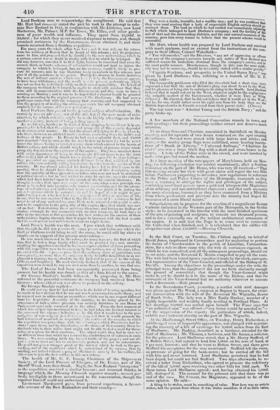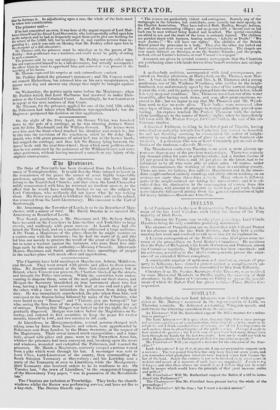the duties of Churchwarden in the parish of Llanellan, Carmarthen-
shire, for it rule to show cause why the writ de contumuce capiendo, on which he was committed, and all the subsequent proceedings, should not
be set aside, and the Reverend E. Morris compelled to pay all the costs.
The writ had been issued upon a signilicacit made by the clerk, surrogate, and representative of the Vicar-General, and official of the Bishop of St.
David's. Among the objections to the proceedings under the writ, the
principal were, that the significavit did not set forth distinctly enough the grommet of committal ; that though the Vicar-General might
make it, yet he should do it in the name of the Bishop, and that the surrogate of the Vicar-General bad no authority whatever to execute such a document.—It tile granted.
In the Secondaries Court, yesterday, a verdict with 400/. damages was given against Mr. Wood, a surgeon at Bognor in Sussex, for erhni- nal conversation with the wife of the Reverend Mr. Wiguelin, Rector of South Stoke. The lady was a Miss Emily- Mulkey, member of a highly respectable and wealthy family residing in Portland Place. At her marriage 10,000/. a-as settled upon herself. The Times says that " an unlimited sums" was otil.red—" any terms would be acceded to "- for the suppression of the report ; the particulars of which, indeed, exhibit most indecent ulacrity on the part of' Mrs. Wignelin.
At the Marlborough Street Office, on Tuesday, Henry Richardson, a middle-aged man of respectable appearance, was charged with negotiat- ing the recovery of a bill of exchange for 5,000/. stolen from the Earl of Shelburne. Mr. Pashley, described as a barrister, attended for the Earl of Shelburne ; Mr. Thomas, a barrister, and Mr. Isaacs, a solicitor, fur the primmer. Lord Shelburne stated, that -a Mr. Henry Stafford, of 0, Bolton Street, had agreed to lend him 5,000/. on his note of hand, at 8 pei cent. interest ; and that he went to Bolton Street, and there gave Stafford his acceptance fur the sum mentioned. Stafford left the room, on pretence of going for the brink-notes; but he carried off the bill with him and never returned. Lord :Shelburne perceived that he had been duped, but could not find Stafford. Two days afterwards, he re- ceived a letter from Richardson, who agreed to procure the redelivery of the bill of 5,000/. upon receiving two other bills for 500/. each. To these term Lord Shelburne agreed ; and, having obtained his 5,000/. bill, destroyed it. The counsel for time prisoner said. that there was an end of the case. Mr. Conant, the Magistrate, appeared to be of the same opinion. He said—
A thing to be stolen, must lie something of value. Now here was an article stolen, and the person from whom it was stolen considers it of so little value,
that he destroys it. In adjudicating upon a case, the whole of the facts must be taken into consideration. The prisoner said—
If lie had committed an error, it was done at the urgent request of Lord. Shel- burne himself and his friend Lord Stavordale, who had repeatedly called upon him on the subject, and he had as frequently urged them not to give one farthing for the return of the 5,0001. bill, but to advertise it, and caution persons from ne- gotiating it ; audit was only on Monday that Mr. Pashley called upon him in the character of a bill-discounter.
Yr. Thomas said, the prisoner must be mistaken as to the person of Mr. Pashley : that gentleman was a barrister, and could never be guilty of acting
its such a manner.
The prisoner said he was not mistaken : Mr. Pashley not only called upon him and represented himself to be a bill-diseounter, but actually accompanied the direr when he went to apprehend lain, and assisted or was present at the
searching of Ms house. Mr. Thomas expressed his surprise at such extraordinary conduct.
Mr. Pashley denied the prisoner's statement ; and Mr. Conant would not commit Richardson, but released him on his own recognizances, to appear next day and answer any charge that might be brought against Mtn.
On Wednesday, the parties again came before the Magistrate; when Mr. Pashley stated, that Lord Shelburne had resolved to indict Rich- ardson at the Central Criminal Court. Accordingly, he was bound over to appear at the next sessions of that Court. Mr Thomas, for the prisoner, applied for one of the 500/. bills which the Policemen had taken when Richardson was apprehended; but the Magistrate postponed his decisiou on that application.



























 Previous page
Previous page